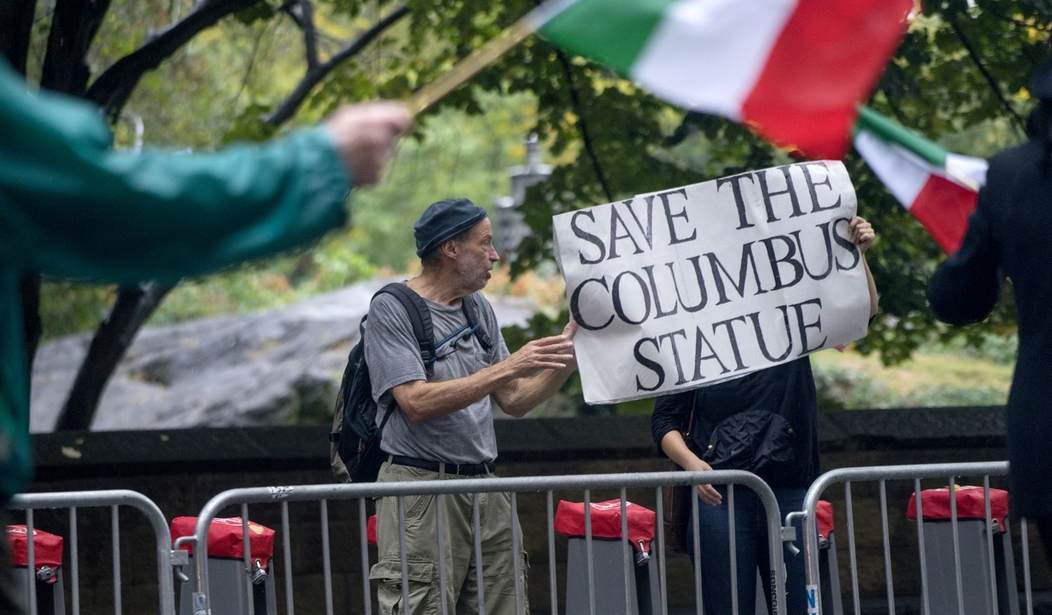The real Columbus whom few today know much about is an exemplary figure worthy of celebrating for many reasons. He was born in 1451 in the port city of Genoa, in what is now Italy, and was named Cristofor Colombo. It has been said that he chose to call himself Christopher Columbus because he liked what this name meant. In Latin, Columbus means dove while Christopher means Christ-bearer.
Some modern-day revisionist historians have taken cheap shots at Columbus, taking a chapter out of Lenin in charging him with being an imperialist. Others blame Columbus for unfair treatment of the various indigenous people without considering that it wasn’t so much Columbus, but the mix of his Spanish machismo crew encountering ruthless indigenous tribes that included cannibals and the warrior culture of the Aztecs that contributed to the strong force needed to survive.
In fact, Columbus never set foot on or even saw any territory that later became part of the continental United States. Columbus’ four expeditions to the New World between 1492 and 1504 were focused exclusively on Caribbean islands and territories which are now Latin America—Central America and South America. The primary legacy of Columbus was that in discovering the New World, he opened the door to exploration and colonization of those new territories by Europeans who followed.
Columbus left voluminous writings that reveal what motivated him to do what he did. Born and raised in Genoa, Italy, he was the consummate self-made man who went to sea crewing on various ships at an early age. As an inspired Christian, Columbus was deeply affected by the militant face of Islam at the eastern end of the Mediterranean that created a blockade to Europe’s important trade with the Orient. It was then that he felt God’s conviction to find a western sea route, knowing it would have far-reaching benefits.
Recommended
Columbus faced death numerous times. When the Flemish-flagged ship on which he was crew was attacked and sunk off the coast of Portugal, he survived by sheer determination, finding some flotation debris and then kicking his way to shore some five miles away. For a seafarer with his ambition and vision, there was no better country on which to wash up than Portugal, a nation with the world’s most advanced tools of navigation and map-making. There he learned about celestial navigation, which further confirmed his confidence to sail west “around” the world to India and the Spice Islands. By his late thirties, his “calling” came, recorded in his diary: “It was the Lord who put into my mind, [and] I could feel his hand upon me…that it would be possible to sail from here to the Indies.”
Recognizing the cost of undertaking such a voyage required state sponsorship, Columbus spent the next six years traipsing across Europe seeking support from sovereignties of the leading maritime countries, only to find rejection and ridicule. Queen Isabella and King Ferdinand of Spain had turned down Columbus several times. But because of his Christian faith, seafaring skills, and conviction about finding a westward passage, and his brave willingness to lead an armed flotilla to rescue the Church of the Holy Sepulcher from Muslim hands in the eastern Mediterranean, they had a change of heart toward Columbus.
Few years in history have been punctuated by such pivotal events as what happened in 1492. It was in that year that Christendom—still suffering from the loss of Constantinople to the Muslim Turks 40 years prior—drove Islam out of Spain and Europe with Isabella and Ferdinand playing the pivotal role. They then decided to support Christian expansion and finance the exploration and evangelistic expedition of Columbus.
In his first voyage of three ships—the Nina, Pinta and Santa Maria—after being at sea for two months Columbus faced an anxious crew, who believed landfall should already have been made weeks before. When they became mutinous and threatened to heave Columbus overboard if he did not agree to turn back, Columbus turned to God. In his personal diary that has been preserved, Columbus recorded that God inspired him to make a deal with his Spanish crew and stake his life on it. He asked for three more days, and if land was not sighted, the crew could do with him as they wished.
As Providence would have it, in the early morning hours of the third day on October 12, under the light of the moon and the stars, the lookout from the ship Pinta, shouted out the siting of land. Assuming it was an island to the east of India or China, Columbus had no idea that he was about to discover a new part of the world—the island outskirts of a massive continent—far from the Orient.
Columbus’s perseverance and courage in this first transatlantic crossing and three subsequent crossings inspired successors from northern Europe who had been transformed by the Protestant Reformation with the ideas of equality and freedom. They would set out to pursue a new life in that New World, ultimately establishing thirteen different colonies in coastal North America.
Suffering injustice from Great Britain many years later, those colonists reluctantly banded together to fight for independence. Over the six years of the Revolutionary War, they lost more battles than they won. But like the course of Columbus, George Washington’s persistence, courage and faith in God empowered an underequipped and underfunded colonial army to get to final victory and achieve independence. That in turn enabled the founding of a new nation, unlike any other—one based on the revolutionary idea that people’s life, liberty, and pursuit of happiness were inviolable because those rights came from God and not the state.
Seen from the big picture, Columbus Day is worth keeping and honoring because it was foundational to founding a new nation by people who largely shared the core beliefs and the qualities of character that were also exhibited by Columbus. It could even be said that Columbus Day is the holiday that commemorates the character, attitudes and choice of human action that made the other American holidays possible.
Scott S. Powell is senior fellow at Discovery Institute, and a member of the Committee on the Present Danger-China. His recent book, Rediscovering America, was #1 Amazon New Release in the history genre for eight weeks. (https://www.amazon.com/dp/1637581599). Reach him at scottp@discovery.org

























Join the conversation as a VIP Member